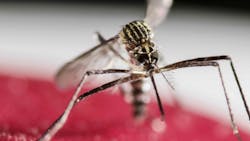Did you know that mosquitoes can swarm, just like locusts? If conditions are right, fertile breeding leads to overcrowding, and the hungry insects will ruthlessly start sucking on the blood of any animal they can find. These blood thirsty beasts are also vectors for some of the world’s deadliest diseases. Seriously, the most dangerous creature on earth, without question, is the mosquito. The diseases mosquitoes spread have been responsible for killing more people than all the wars in history. Mosquitoes transmitting malaria kill 2 million to 3 million people and infect another 200 million or more every year. Tens of millions more are killed and debilitated by a host of other mosquito-borne diseases including Chikungunya, Yellow Fever, Dengue, West Nile, Encephalitis (six forms), and now, the Zika Virus. Humans kill each other at a rate of 475,000 per year.
Not a very a glamorous way to go. However, we are extremely outnumbered by these fierce tiny creatures that we cannot control. Personally, I am afraid of mosquitoes (especially after researching for this article). Actually, the fear of mosquitoes has a name: anopheliphobia. I am not alone, it appears that WHO and the CDC also suffering the same phobia and are spreading their concern internationally and globally. Are you prepared?
I’m not a survivalist so to speak. Yes, I do have a back-up of canned everything that sounded remotely palatable and water, lots and lots of water (and ground coffee and filters to go with the water). I am a nurse, so first-aid supplies, OTC medications, and some antibiotics are in abundance. Am I ready for an invasion of killer mosquitoes. Not so much.
Mosquito Fun Facts to Know and Share
- Mosquitoes have been around since the Jurassic period; making them about 210 million years old. Alexander the Great is believed to have died of malaria in 323 B.C. Malaria also claimed the life of Genghis Khan in 1227.
- There are more than 3,500 species of mosquitoes. About 175 of them are found in the United States. The members of three genera of mosquito, Anopheles, Aedes and Culex, are the leading causes of mortality and morbidity in humans.
- Mosquitoes do not bite; they pierce skin with "proboscis" and suck the blood. Only females feed on blood; they need the protein to reproduce. A female can drink up to three times her weight in blood.
- Lifespan: Adult males usually live 10days or less; females 2-3 weeks.
- One female mosquito can lay anywhere between 100-300 eggs at one time, in her lifetime she can lay between 1,000-3,000 eggs.
- Breeding: A mosquito’s lifecycle has four stages – egg, larva, pupa, and adult. Mosquitoes need water to breed since all mosquitoes spend their larval and pupal stages in water.
- Mosquitoes hibernate. They are cold-blooded and prefer temperatures over 80 degrees. At temperatures less than 50 degrees, they shut down for the winter.
- Chemicals in mosquito saliva prevent blood from clotting and evoke a response that causes localized redness, swelling and itching.
- Some individuals may have serious reactions to this saliva. At its worst, a mosquito bite can cause anaphylaxis, which requires emergency medical attention.
- Mosquitoes use heat sensors around their mouthparts to detect the warmth of your body (actually the blood inside it) then land on the victim and locate the best capillaries for tapping. They are attracted to the carbon dioxide we exhale from up to 100 feet away. Dark colored clothing and the changes of waves of light from your movement also attract mosquitoes as do perfumes and colognes.
- Mosquitoes feed day and night depending on the species.
The Developing Saga of the Zika Virus
The news stories about this disease are daily headlines with hourly updates. In a nutshell the Zika virus, which is primarily transmitted by mosquitoes, has reached pandemic levels in Mexico, Central America, the Caribbean, and South America. It is threatening our southern states. The scientific community believes that there is a very strong possibility of a correlation between the Zika virus and microcephaly in the fetuses of pregnant women. Microcephaly is a rare neurological condition in which an infant's head is significantly smaller than the heads of other children of the same age and sex. Complications of microcephaly include developmental delays, dwarfism, facial distortion, hyperactivity, mental retardation, and seizures.
The good news is that Zika is not a deadly virus. The bad news; there is currently no vaccine or medication to prevent the Zika virus infection. The worst news is that the Aedes aegypti mosquito, the primary vector for Zika, is also responsible for yellow fever, dengue, West Nile and chikungunya viruses.
Additionally, antiviral treatment is not currently available for Zika virus disease. The only treatment available is supportive and includes rest, fluids, and analgesic and antipyretic medications. Aspirin and other nonsteroidal anti-inflammatory medications should be avoided until dengue virus infection can be ruled out.
Protect Yourself and Your Loved Ones
Bug repellents are effective in repelling mosquitoes; but they do not kill them. Experts agree repellents containing DEET are the most effective way to avoid becoming a mosquito’s next meal, but DEET is also a known neurotoxin that has been linked to memory loss, headache, weakness and shortness of breath. DEET-free ingredients that are proven to help combat mosquitoes with minimal risk are also available.
- DEET (NN-diethyl-meta-toluamide) was developed in 1944by the United States Department of Agriculture for use by the United States Army. It provides protection against mosquitoes, ticks, fleas, chiggers, leeches, and many other biting insects. DEET comes in concentrations of 7.5% - 100%. Lower concentrations are sufficient for most outdoor protection. A 15% concentration is recommended for children. DEET can be used directly on skin or applied to clothes. Sprays containing DEET have the longest protection time; an average five hours of complete protection.
- Picaridin is a synthetic compound developed from a plant extract from the genus Piper (the same plant genus that produces table pepper). Studies have shown picaridin is as effective as DEET in repelling mosquitoes. Pros: picaridin is odorless, non-greasy, and does not dissolve plastics or other synthetics
- IR3535 is a synthetic amino acid that protects against mosquitoes for 4-8 hours.
- DEET, Picaridin, and IR3535 are all safe to use in pregnancy.
- Wear long sleeve shirts and pants; shoes and socks are helpful too.
****Important Information for First Responders****
- Treating flame resistant fabrics with DEET and Picaridin will impact the flammability of the FR clothing and should be avoided. Most of today’s tactical equipment, including Kevlar vests, are flame resistant, do not apply these chemicals to your equipment.
- Permethrin is a synthetic chemical that acts like natural extracts from the chrysanthemum flower. Permethrin is not only a mosquito repellent it actually kills these nasty insects. Permethrin is for use on clothing, tents, and other gear. Permethrin does not interfere with flame resistance; it is safe to use on all of your tactical gear. A coating will last for 2-6 weeks. Do not apply this chemical directly to your skin
Additionally, keep mosquitoes outside: use air conditioning or make sure that you repair and use window/door screens. Eliminate mosquito breeding grounds from your home and community. The American Mosquito Control Association, founded in 1935, is a scientific/educational, not-for-profit public service association. There website contains countless tips on successful mosquito control. I strongly encourage you to visit them at http://www.mosquito.org/.
Tips for Dealing with the Zika Virus
I would suspect with all of the news coverage about the potential infestation 9-1-1 dispatchers are already fielding citizen calls. City and disaster planners are bound to be busy as well. And let’s not forget healthcare, insect bites could possibly flood emergency rooms and urgent care facilities. As a nation, under the exaggerated hype from the media, we are ripe for panic right now even though there has been no Zika virus mosquito transmitted case in this country yet. Multiply that panic by tenfold when the mosquitoes actually come out of hibernation and begin hunting for their next meal. The best thing you can do at this point, and instruct others to do, is to stay informed and get updates from a reliable source such as the CDC’s web page at http://www.cdc.gov/zika/.
Going back to doomsday scenarios. Mosquitoes have the potential to be used as a biological warfare agent. Entomological warfare (EW) uses insects in a direct attack or as vectors to deliver a biological agent, such as plague, yellow fever, or cholera. EW involves infecting insects with a pathogen and then dispersing the insects over target areas. Actually, the US has already tested this. During the 1950s, the U.S. military established a top secret entomological warfare facility that could produce more than 100 million mosquitoes infused with yellow fever in a matter of days. The government tested dispersal techniques in Georgia and Florida during this time in operations dubbed “Magic Sword”, “Drop Kick”, “Big Buzz” and “Big Itch”. *Note to Self: add large quantities of insect repellent to emergency kits.
About the Author

Pamela Kulbarsh
Pamela Kulbarsh, RN, BSW has been a psychiatric nurse for over 25 years. She has worked with law enforcement in crisis intervention for the past ten years. She has worked in patrol with officers and deputies as a member of San Diego's Psychiatric Emergency Response Team (PERT) and at the Pima County Detention Center in Tucson. Pam has been a frequent guest speaker related to psychiatric emergencies and has published articles in both law enforcement and nursing magazines.
